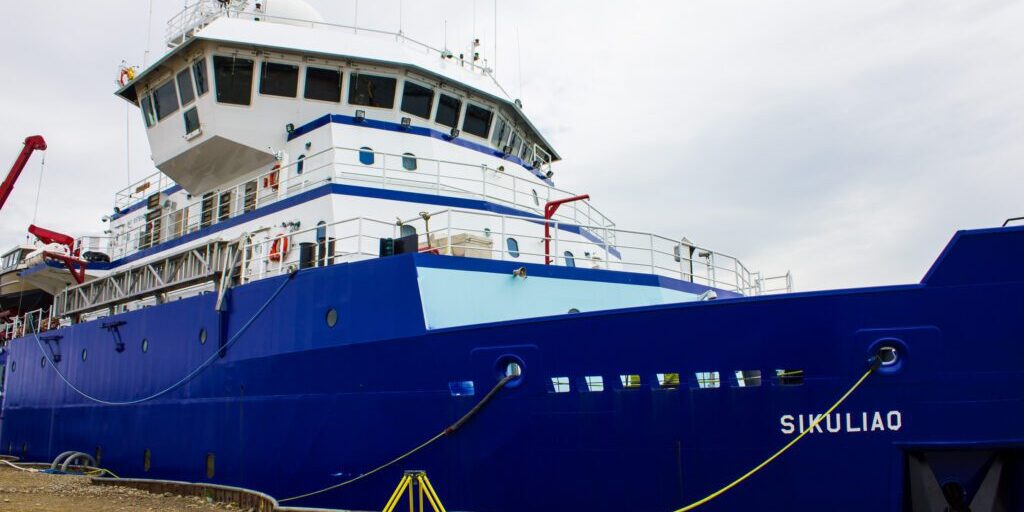Several research ventures slated to take place in the Bering Strait region this summer have been postponed or outright cancelled. Additionally, a regional tribal consortium in Nome is calling for all researchers coming in from the outside to reconsider traveling this season.
“We’re also concerned about the ability to continue to collect long term data sets, as well as the ability to observe ongoing, in the moment, changes that are happening in our ecosystem.”
– Julie Raymond-Yakoubian
Julie Raymond-Yakoubian is the Director of Kawerak’s Social Science Program. She acknowledges there are numerous research projects underway in the region that would help better document and understand the ecosystem-wide changes in the Bering Sea.
However, Raymond-Yakoubian says Kawerak’s Board of Directors decided to send a letter to the research community as a whole, recommending no researchers visit the Bering Strait region this season.
“First and foremost, to not travel to any of our village communities, probably indefinitely until perhaps there’s a vaccine available or there’s some other kind of health guidance that says it’s safe to travel and interact with people; not planning to hold any meetings in Nome or our village communities; and to really consider whether or not to hold meetings in Anchorage that would require village residents to leave their communities and travel outside of the region.”
Raymond-Yakoubian would go on to say that Kawerak also has concerns with research vessel crew changes and the possible exposure that could occur between Nome residents and outside researchers at the local port.
Kawerak’s letter cited the coronavirus pandemic and potential health risks related to outside researchers coming into the region as the main reason for them not to come.
Towards the end of May [May 22nd] NOAA Fisheries announced that five of its six larger research surveys in Alaska were cancelled, due to effects of the coronavirus pandemic. That includes the eastern Bering Sea bottom trawl, the northern Bering Sea bottom trawl with Lyle Britt, and the acoustics survey for Bering Sea pollock.
In addition to the already cancelled NOAA Fisheries ventures, concerns over the coronavirus are also affecting independent research groups like University of Alaska scientists and the Woods Hole Oceanographic Institute [WHOI]. Both had planned to continue more research studies in the Bering Strait region this summer. Alexis Will, a researcher with the University of Alaska Fairbanks, was hoping to continue studying seabirds on St. Lawrence Island this summer. Instead, local residents and subsistence hunters will help gather samples for her and send them to Will.
According to Gay Sheffield with Alaska Sea Grant, the Woods Hole research team who came up on the Coast Guard Cutter Healy last August, was expected to do a follow up study on Harmful Algal Blooms in the Northern Bering Sea. But, their trip for next month has been cancelled.
That same WHOI crew found clams in the Bering and Chukchi Seas with high levels of saxitoxin in them, while onboard the Healy last summer.
Locally, the Port of Nome opened up on June 1st to vessels transiting the Bering Sea, including marine research ships. The port’s COVID-19 regulations include limiting all crews’ contact with local residents, requiring mariners to only go directly from their vessel to the Nome airport or to their designated quarantine location, and all vessels must have submitted an operational plan to Port of Nome staff prior to their arrival.
Port Director Joy Baker told KNOM via email that she thinks it’s unfair to expect research vessels to cancel or postpone their trips to Nome this summer when all other commercial fleets are still able to operate under COVID requirements.
“We don’t see the research fleet as separate from the commodity or construction fleets and expect all to follow the same protocol in maintaining separation from the community. I do think it’s realistic to ask them to not go into the coastal villages, but see no reason they can’t do their crew changes, swap out scientific missions, refueling and resupply in Nome.”
– Joy Baker
Despite the external circumstances, Raymond-Yakoubian says the researchers that have been in touch with Kawerak have all reacted positively to their letter and Kawerak’s justification for their recommendations to the research community.
“So we’re definitely concerned that not all research is going to be able to happen as planned this summer, but at the same time, we prioritized the health and safety and wellbeing of our communities over the conduct of research.”
According to NOAA Fisheries’ press release, they will work with the North Pacific Fishery Management Council this month to determine how to move forward without potentially losing an entire year’s worth of research data.
A possible solution involving an unmanned sailboat drone was just announced by NOAA so they can potentially conduct their upcoming research surveys on pollock in the Eastern Bering Sea.
Image at top: The University of Alaska research vessel Sikuliaq frequently stops through Nome as it conducts various studies in the Bering, Chukchi, and Beaufort Seas. But not this summer. Photo from Emily Russell, KNOM (2015).




